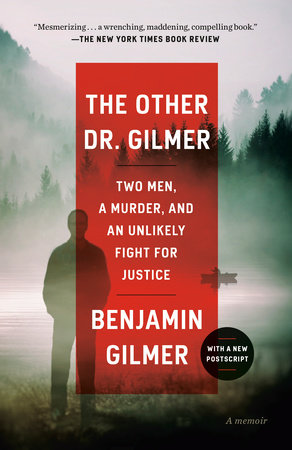The Other Dr. Gilmer
Two Men, a Murder, and an Unlikely Fight for Justice
Benjamin Gilmer
Paperback
March 7, 2023 | ISBN 9780593355183
AmazonBarnes & NobleBooks A MillionBookshop.orgHudson BooksellersPowell'sTargetWalmart
Ebook
March 1, 2022 | ISBN 9780593355176
AmazonApple BooksBarnes & NobleBooks A MillionGoogle Play StoreKobo
Audiobook Download
March 1, 2022 | ISBN 9780593452264
About the Book
A “mesmerizing” (The New York Times Book Review) true story about a shocking crime and a mysterious illness that will forever change your notions of how we punish and how we heal—an expansion on one of the most popular This American Life episodes of all time, now with a new postscript
“A remarkable medical detective story–cum–memoir, grippingly told . . . I was drawn in by every part of it.”—Atul Gawande, #1 New York Times bestselling author of Being Mortal
Fresh out of medical residency, Dr. Benjamin Gilmer joined a rural North Carolina clinic only to find that its previous doctor shared his last name. Dr. Vince Gilmer was loved and respected by the community—right up until he strangled his ailing father and then returned to the clinic for a regular week of work. Vince’s eventual arrest for murder shocked his patients. How could their beloved doctor be capable of such violence? The deeper Benjamin looked into Vince’s case, the more he became obsessed with discovering what pushed a good man toward darkness.
When Benjamin visited Vince in prison, he met a man who appeared to be fighting his own mind, constantly twitching and veering into nonsensical tangents. Sentenced to life in prison, Vince had been branded a cold-blooded killer and a “malingerer”—a person who fakes an illness. But it was obvious to Benjamin that Vince needed help. Alongside This American Life journalist Sarah Koenig, Benjamin resolved to understand what had happened to his predecessor. Time and again, the pair came up against a prison system that cared little about the mental health of its inmates—despite more than a third of them suffering from mental illness.
The Other Dr. Gilmer takes readers on a riveting and heart-wrenching journey through our shared human fallibility, made worse by a prison system that is failing our most vulnerable citizens. With deep compassion and an even deeper sense of justice, Dr. Benjamin Gilmer delves into the mystery of what could make a caring doctor commit a brutal murder. And in the process, his powerful story asks us to answer a profound question: In a country with the highest incarceration rates in the world, what would it look like if we prioritized healing rather than punishment?
“A remarkable medical detective story–cum–memoir, grippingly told . . . I was drawn in by every part of it.”—Atul Gawande, #1 New York Times bestselling author of Being Mortal
Fresh out of medical residency, Dr. Benjamin Gilmer joined a rural North Carolina clinic only to find that its previous doctor shared his last name. Dr. Vince Gilmer was loved and respected by the community—right up until he strangled his ailing father and then returned to the clinic for a regular week of work. Vince’s eventual arrest for murder shocked his patients. How could their beloved doctor be capable of such violence? The deeper Benjamin looked into Vince’s case, the more he became obsessed with discovering what pushed a good man toward darkness.
When Benjamin visited Vince in prison, he met a man who appeared to be fighting his own mind, constantly twitching and veering into nonsensical tangents. Sentenced to life in prison, Vince had been branded a cold-blooded killer and a “malingerer”—a person who fakes an illness. But it was obvious to Benjamin that Vince needed help. Alongside This American Life journalist Sarah Koenig, Benjamin resolved to understand what had happened to his predecessor. Time and again, the pair came up against a prison system that cared little about the mental health of its inmates—despite more than a third of them suffering from mental illness.
The Other Dr. Gilmer takes readers on a riveting and heart-wrenching journey through our shared human fallibility, made worse by a prison system that is failing our most vulnerable citizens. With deep compassion and an even deeper sense of justice, Dr. Benjamin Gilmer delves into the mystery of what could make a caring doctor commit a brutal murder. And in the process, his powerful story asks us to answer a profound question: In a country with the highest incarceration rates in the world, what would it look like if we prioritized healing rather than punishment?
Read more
Close




